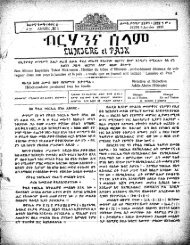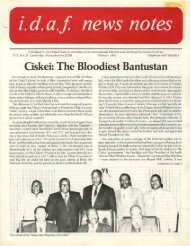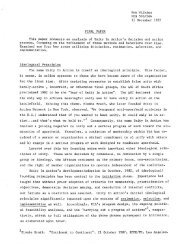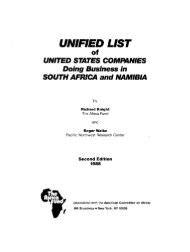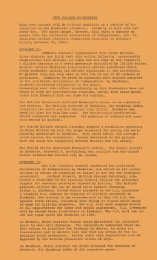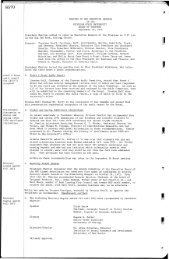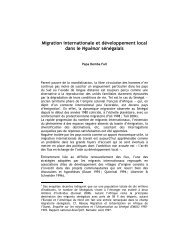Appendix - Matrix - Michigan State University
Appendix - Matrix - Michigan State University
Appendix - Matrix - Michigan State University
You also want an ePaper? Increase the reach of your titles
YUMPU automatically turns print PDFs into web optimized ePapers that Google loves.
Before, during, and after a rugby game played in<br />
England between Oxford <strong>University</strong> and a touring<br />
South African team, the South Africans were constantly<br />
accompanied by a squad of police to protect<br />
them from English student demonstrators. During<br />
another game on the tour, fences were erected around<br />
the athletic field to restrict the movement of fans and<br />
no refreshments were sold to prevent fans from showering<br />
the South African players with bottles and cartons.<br />
On several other occasions, as many as five thousand<br />
demonstrators fought with police trying to break up<br />
what was termed by Peter Hain, 19-year-old chairman<br />
of the Stop the South African Tour Committee, as an<br />
attempt ". . . to turn South Africa's participation in<br />
international sports into a farce." In Dublin, Ireland,<br />
three thousand people turned out to demonstrate<br />
against the touring South Africans. The incident is all<br />
the more striking in light of the fact that Northern<br />
Ireland is still in the throes of what amounts virtually<br />
to a civil war. The demonstration was ultimately<br />
broken up by the Irish police since, in their words<br />
"It constituted a threat to public calm."<br />
These international protests have lent added thrust<br />
to the movement against South Africa's participation<br />
in international athletics, a movement which started<br />
before the 1968 Olympic Games and resulted in South<br />
Africa's being banned from the games. But again,<br />
seemingly everyone has gotten the message except the<br />
ruling body in South Africa responsible for setting that<br />
countries policies on race and athletics.<br />
On January 28, 1970, South African Sports Minister<br />
Frank Waring announced that Arthur Ashe would "not<br />
be allowed to enter South Africa as a member of the<br />
United <strong>State</strong>s team to compete in the South African<br />
open tennis championships or for any other reason due<br />
to Ashe's general antagonism toward South Africa's<br />
racial policies." World reaction to this blatant act of<br />
racial discrimination was immediate. Even South<br />
Preface to the Paperback Edition • xviii<br />
Africa's own athletes spoke out against it. Gary Player<br />
stated: "The Arthur Ashe case is probably the last<br />
straw to make our isolation in the field of sport complete."<br />
Cliff Drysdale, South Africa's leading tennis<br />
player, said: "For this ridiculous act, we are going to<br />
be kicked out of the Davis Cup matches. But this will<br />
only be the immediate consequence. The present rugby<br />
tour demonstrations will be a Sunday school picnic<br />
compared to what South Africa's teams and individual<br />
athletes will face abroad from now on." Vernon Slavin,<br />
a South African swimmer stated: "I can see that soon<br />
all South African athletes will be barred from the<br />
United <strong>State</strong>s as a result of this. They cannot continue<br />
to let us [into the United <strong>State</strong>s] when their<br />
citizens can't come here. After that it is only a matter<br />
of time before we wind up competing against each<br />
other here because no other country will have us."<br />
So the battle against apartheid is still being waged<br />
and will be intensified if necessary until South Africa<br />
either changes its policies or that country's athletes<br />
have been barred effectively from all international competition.<br />
The spread of unrest and protest against athletic<br />
exploitation and injustice to schools such as Minnesota,<br />
Wyoming, Iowa, Wisconsin, Oregon <strong>State</strong>, and<br />
others indicate that the revolt will not soon die-in<br />
spite of setbacks along the way. At Indiana, 14 black<br />
athletes were summarily kicked. off the football team<br />
and also lost their athletic grants-in-aid. At Wyoming<br />
every black member of the football team was dropped<br />
from the squad for wearing black armbands to protest<br />
a game to be played against B.YD. But such acts of<br />
retaliation only serve to feed the flames of the revolt.<br />
Professional athletics have by no means been immune<br />
from the impact of the revolt. Curt Flood currently<br />
has a million dollar suit in court filed against<br />
Preface to the Paperback Edition • xix



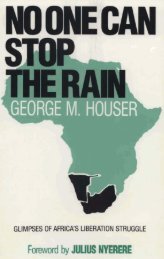
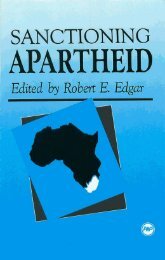

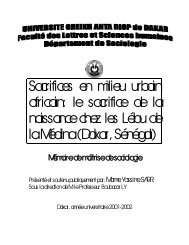
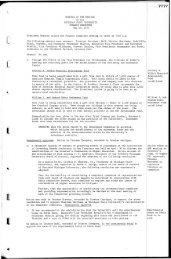
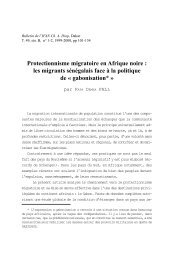

![Synthèse [6] DEFALL..INSTRAW.pdf - Matrix](https://img.yumpu.com/17880734/1/190x245/synthese-6-defallinstrawpdf-matrix.jpg?quality=85)
